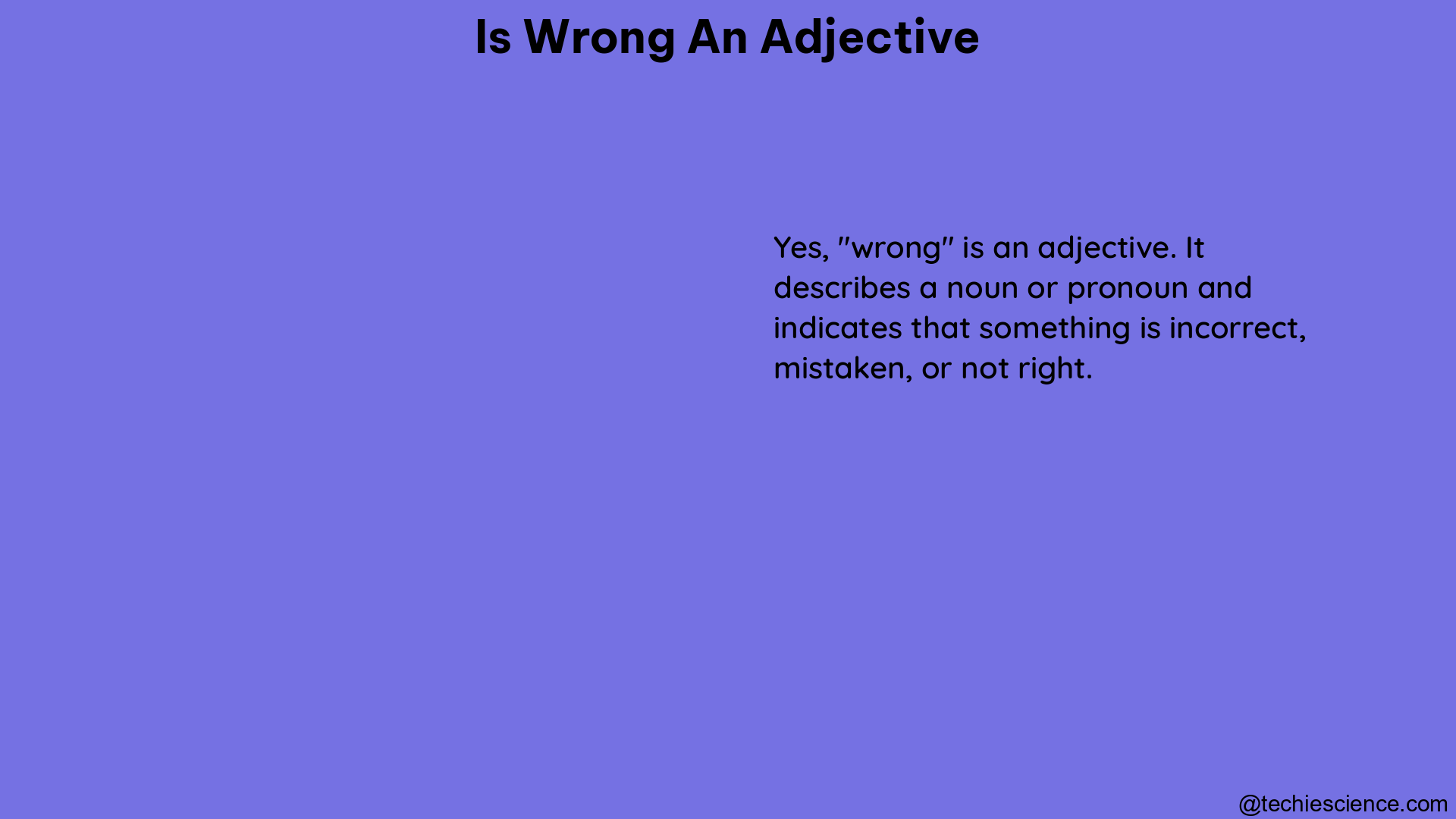Yes, “wrong” is an adjective that can be used to describe various contexts where something is incorrect, morally unacceptable, or not suitable for a particular purpose. This comprehensive guide will delve into the grammatical specifications, examples, synonyms, and references related to the use of “wrong” as an adjective.
Grammatical Specification
Definition
The adjective “wrong” means not correct, not in conformity with fact or truth, or not morally right. It is used to express that something is inaccurate, inappropriate, or unethical.
Forms
The adjective “wrong” has several grammatical forms:
- Base Form: wrong
- Plural Form: wrongs
- Past Tense: wronged
- Present Participle: wronging
- Comparative Form: wronger
- Superlative Form: wrongest
These forms allow “wrong” to be used in various contexts and sentence structures, providing flexibility in its application.
Examples

Incorrect Fact
“You thought your paper was due a week from Friday, but you were wrong. It’s due tomorrow. Better start typing!”
In this example, “wrong” is used to indicate that the person’s understanding of the paper’s due date was incorrect or not in conformity with the actual due date.
Moral Principle
“You might believe that the death penalty is just wrong, but not everyone agrees with you.”
Here, “wrong” is used to express a moral judgment, suggesting that the death penalty is unethical or morally unacceptable from the speaker’s perspective.
Inappropriate
“It’s frustrating to get all the way home from the store before you realize you grabbed the wrong kind of milk — buttermilk instead of two percent.”
In this case, “wrong” is used to indicate that the milk purchased was not suitable or appropriate for the intended purpose, which was to buy the desired type of milk.
Synonyms
Erroneous
“Her answer that Thomas Jefferson was the second president of the United States is erroneous — it was John Adams, of course.”
The synonym “erroneous” conveys a similar meaning to “wrong,” suggesting that the information provided was factually incorrect or not in accordance with the truth.
Incorrect
“Some of his facts are questionable, others are plainly wrong.”
The synonym “incorrect” directly aligns with the meaning of “wrong,” indicating that the facts in question are not accurate or true.
Inaccurate
“Their estimation of the cost was wildly inaccurate.”
The synonym “inaccurate” implies that the estimation was not precise or correct, similar to the meaning of “wrong” in this context.
Grammatical Usage
The adjective “wrong” can be used in various grammatical constructions to modify nouns, pronouns, or other parts of speech. Here are some examples:
- Modifying a Noun: “The wrong answer on the test cost her a full letter grade.”
- Modifying a Pronoun: “She knew she was wrong about the deadline.”
- Modifying an Adverb: “The directions were wrong, and we ended up at the wrong destination.”
- Modifying an Adjective: “The color of the shirt was the wrong shade of blue.”
- Predicate Adjective: “The decision was wrong, and the team acknowledged their mistake.”
In each of these examples, “wrong” serves as an adjective, providing additional information about the noun, pronoun, adverb, or adjective it modifies.
Conclusion
In summary, “wrong” is undoubtedly an adjective that can be used to describe various contexts where something is incorrect, morally unacceptable, or not suitable for a particular purpose. Its versatility in grammatical forms and usage allows it to be a valuable tool in the English language, enabling precise and nuanced communication.
References
- https://www.vocabulary.com/dictionary/wrong
- https://www.dictionary.com/browse/wrong
- https://www.merriam-webster.com/thesaurus/wrong
- https://www.merriam-webster.com/dictionary/wrong
- https://dictionary.cambridge.org/us/dictionary/english/wrong

Hi…..I’m a graduate with a Bachelor’s degree in English Literature. I wish to do a Masters in the same field someday and continue my career in Academia.
Let’s connect through LinkedIn: